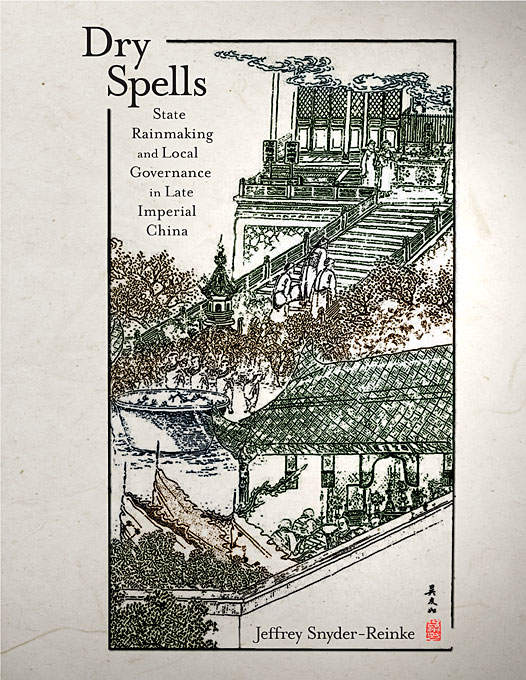Snyder-Reinke, Jeffrey. Dry Spells: State Rainmaking and Local Governance in Late Imperial China (Harvard University Asia Center, 2009).
 In this book, Jeffrey Snyder-Reinke examines numerous practices aimed at ending droughts in Qing China. The author demonstrates through his study that local officials resorted to acts that fall outside of Qing-supported Confucian rhetoric, including esoteric rituals performed by ritual specialists from diverse traditions. The author at the same time shows that there was an underlying Chinese belief that connected moral deficiency with disaster. This resulted various efforts to rectify such behavior, including community-wide prohibitions. This moral equation resulted, in extreme cases, in even the suicides of local elites in extreme cases, if it was believed that such an act could end the crisis. Dry Spells not only shows the lengths to which local elites would go to stave off disaster, but also argues that there was a growing sense of local autonomy and communal welfare as the local elites could and did not not rely on government relief.
In this book, Jeffrey Snyder-Reinke examines numerous practices aimed at ending droughts in Qing China. The author demonstrates through his study that local officials resorted to acts that fall outside of Qing-supported Confucian rhetoric, including esoteric rituals performed by ritual specialists from diverse traditions. The author at the same time shows that there was an underlying Chinese belief that connected moral deficiency with disaster. This resulted various efforts to rectify such behavior, including community-wide prohibitions. This moral equation resulted, in extreme cases, in even the suicides of local elites in extreme cases, if it was believed that such an act could end the crisis. Dry Spells not only shows the lengths to which local elites would go to stave off disaster, but also argues that there was a growing sense of local autonomy and communal welfare as the local elites could and did not not rely on government relief.
There are several contributions of note offered by Dry Spells that would be useful in the classroom. The first is the emphasis on the Chinese belief of gan’ying 感应, or “sympathetic resonance”. This belief effectively connects the familiar ‘seen’ world, with an ‘unseen’, undefined moral authority that responds to the moral climate of a particular area, bestowing blessings and punishments respectively. When disaster struck, there had to have been a reason. Addressing the cause thus provided a way to end the crisis. Dry Spells again shows that there were a variety of approaches to end droughts and bring about relief; these were drawn from several sources including Daoist and Buddhist esotericism, folk beliefs, and even manuals based on what had worked in the past—Snyder-Reinke has translated and included in his book one such manual, called Ji Shenzhai’s Complete Book of Rainmaking.
When one considers the effects of modernization on East Asian religion and superstition, one need only look to the Meiji Period’s growing consciousness of, and legislation against, “superstitious” beliefs. While the Qing Dynasty is often characterized by a resurgence of literati thought that resulted in a shift towards empirical reasoning, Snyder-Reinke’s study shows a continued reliance on gan’ying and what some would certainly call superstitious folk practices at the local level. Those interested in the construction of World Religions may find Dry Spells useful in this respect. In closing, I would strongly recommend Dry Spells to anyone with an interest in pre-modern approaches to disaster. More specifically, those with an interest in Late Imperial Chinese approaches to disasters, as well as those with a curiosity about gan’ying, will find Synder-Reinke’s work to be worthwhile.
James Zeller, Religion, Florida State University
![[Teach311 + COVID-19] Collective](https://blogs.ntu.edu.sg/teach311/files/2020/04/Banner.jpg)